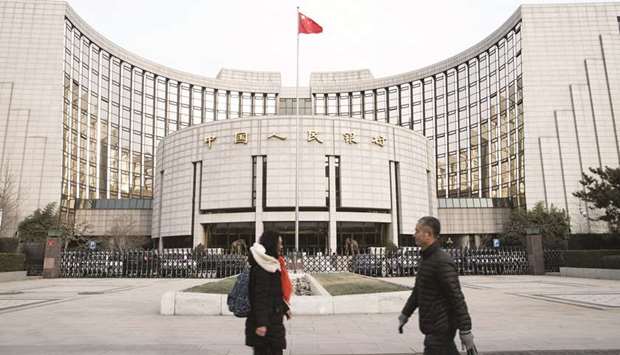Central banks across Asia are moving to defend their currencies from recent declines as escalating trade tensions between the US and China weigh down exports and economic growth.
Officials in Beijing, Seoul and Jakarta were among those taking steps yesterday to arrest weakness that’s affected most key currencies in Asia this month. The yen, a traditional haven, is the main exception to the trend.
“Chinese authorities are trying to cap the yuan from weakening because they know the harm caused by capital flowing out from the region will be bigger than the trade benefits coming from a weak local currency,” said Kim Yumi, a market strategist at Kiwoom Securities in Seoul. “This applies to other Asian central banks, especially at a time of high uncertainty,” she said.
The People’s Bank of China set its currency fixing at a level stronger-than-expected for a third straight day. The higher reference rate, which restricts the moves of the onshore yuan by 2% on either side, helped to halt a record slide in the currency’s value against a basket of peers.
That followed a plan from the PBoC on Tuesday to sell bills in Hong Kong, a move that would drain offshore liquidity and make it more expensive to short the currency. The developments come against a backdrop of a growing chorus of officials and state media, including the head of the nation’s foreign-exchange regulator, assuring investors that the yuan will remain stable.
It’s dropped about 2.5% this month, edging closer to 7 per dollar, a psychological milestone that hasn’t been touched in more than a decade.
Authorities in Seoul called a snap meeting to discuss what they see as distortions in the currency market, taking the firmest step yet to address the won’s decline this month.
The currency has fallen too rapidly in a short period of time, and its weakness is excessive compared to fundamentals, said a Bank of Korea official, who asked not to be identified citing the central bank’s disclosure rules. A finance ministry official said authorities would meet soon to discuss the distortion.
The won is Asia’s worst-performing currency this year as it’s been buffeted by a sharp slowdown in chip exports while the trade war has hurt Korea’s economic outlook. The currency rose 0.1% yesterday to 1,193.15 per dollar.
Bank Indonesia – which has been intervening in markets recently – said it would coordinate with banks and other institutions to guard rupiah stability and market confidence as riots rocked Jakarta.
The rupiah dropped 0.3% yesterday to a five-month low of 14,528 per dollar amid clashes between police and supporters of Indonesian presidential candidate Prabowo Subianto that claimed six lives and left hundreds injured.
Bank Indonesia is ready to maintain stability in the currency and bond markets, Nanang Hendarsah, executive director for monetary management at the central bank, said yesterday.
The escalation of trade-war rhetoric between the US and China, and the latest news that the Trump administration is considering cutting off the flow of vital American technology to as many as five Chinese companies, has currency strategists mapping out foreign-exchange implications.
Bank of America Corp. sees the Japanese yen strengthening as investors flee risky assets, and has recommended an associated euro-yen trade. Goldman Sachs Group Inc warns that currencies from the euro to South Africa’s rand and Chile’s peso could be in the firing line. And Westpac Banking Corp. sees bonds as a safe bet.
“I think we will see a lot more emergency meetings in many places if things stay like this,” said Michael Every, head of Asia financial markets research at Rabobank in Hong Kong.

Pedestrians walk past the People’s Bank of China headquarters in Beijing. The PBoC set its currency fixing at a level stronger-than-expected for a third straight day. The higher reference rate, which restricts the moves of the onshore yuan by 2% on either side, helped to halt a record slide in the currency’s value against a basket of peers.
